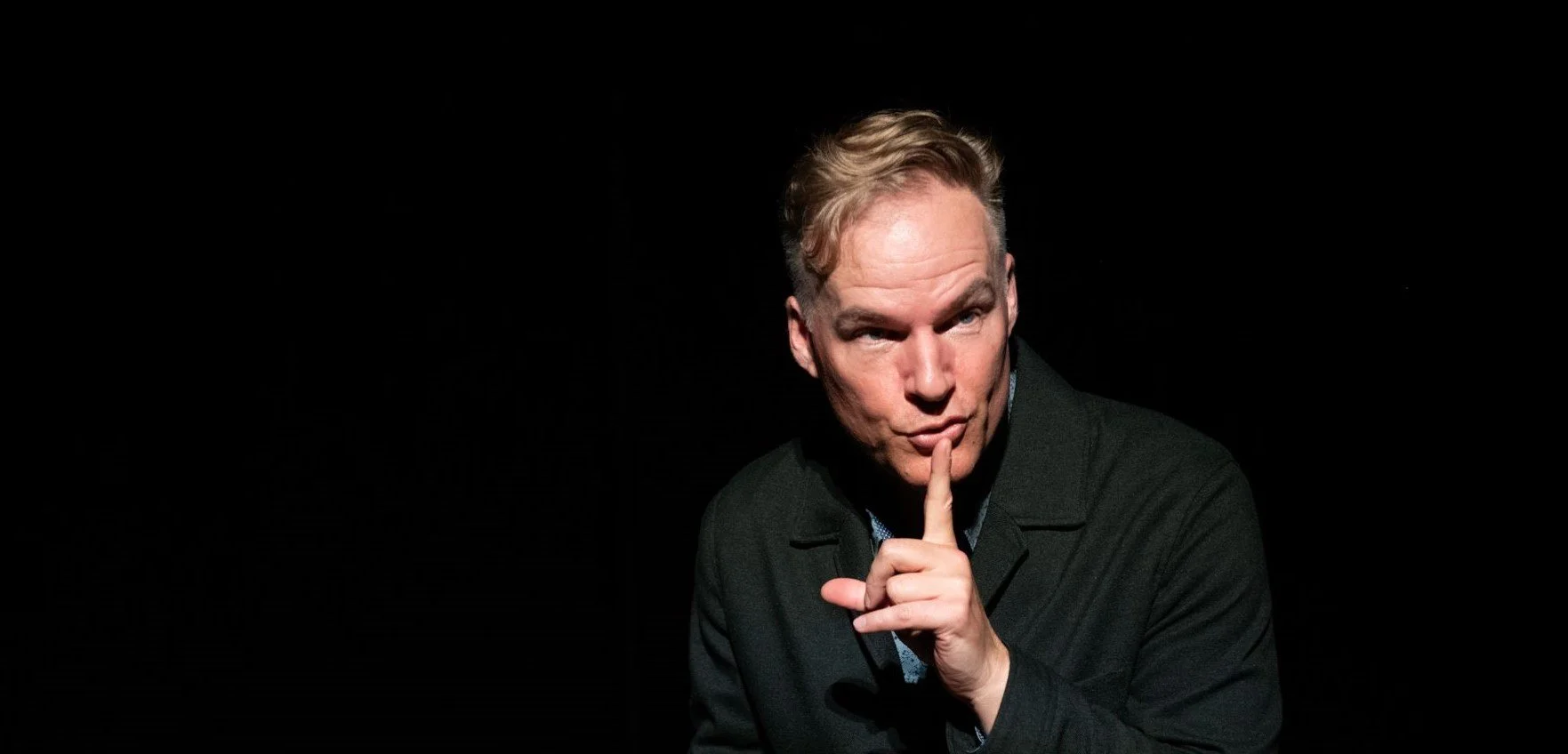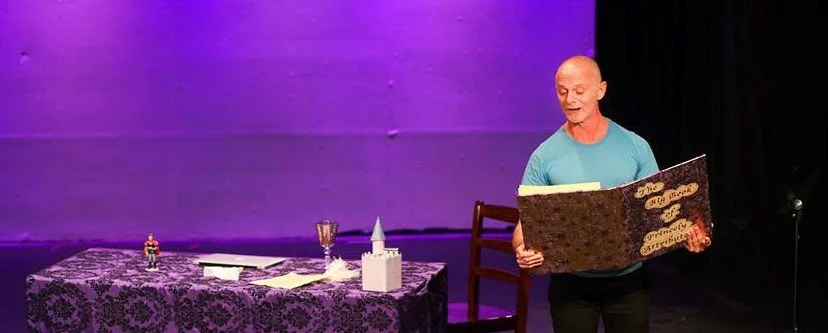Old Testament history has been amply recreated on the stage and in film—enslavement in Egypt, the Hebrews’ 40-year desert trek to Mount Sinai, the Ten Commandments, transmission of Jewish laws, and a passionate yearning for the Promised Land. In Two Jews, Talking, playwright Ed. Weinberger loosely and innovatively paints both this saga, a “revisionist” desert adventure, and its cemetery-centered finale, with a very broad brush. He does so with the aid of veteran actors Hal Linden and Bernie Kopell, whose characters face off against each other theologically and temperamentally yet find comfort in each other’s company.
The Near Disaster of Jasper & Casper
It can’t be easy to invent a brand-new fairy tale; even James Lapine and Stephen Sondheim had to rely on the old favorites. But here comes Jason Woods, not only cobbling together an entirely original fantasy with The Near Disaster of Jasper & Casper, but performing all the parts, with distinctive voices and personalities for all the characters. Woods may seize on some familiar plot points, and he’s not always tidy: “Jasper and Casper” don’t rhyme perfectly with “Disaster,” as he seems to have been aiming for. But he knocks himself out to engage the audience.
Macbitches
Sophie McIntosh’s Macbitches is proof positive that some of the most exhilarating theater in New York City is being staged in Off-Off-Broadway houses. McIntosh’s 85-minute piece dramatizes what happens when Hailey (Marie Dinolan), a freshman acting major, is unexpectedly cast in the plum role of Lady Macbeth, and Rachel (Caroline Orlando), the queen bee of a college theater department in Minnesota, is left with big bruises on her ego.
Katsura Sunshine’s Rakugo
Katsura Sunshine’s Rakugo is a fresh and funny solo show in which the director and star, Katsura Sunshine, spins yarns with entrancing charm in the ancient Japanese comic storytelling tradition known as rakugo. It is a pleasure to come across a piece that deals, wittily and delightfully, with a little-known dramatic art form.
The Panic of ’29
The Panic of ’29 isn’t deep. It hasn’t much on its mind, except camp silliness and an encyclopedic knowledge of old-movie tropes, mixed up and scrambled and spilled out on the modest 59e59 stage. Graham Techler’s loose comedy is a Less Than Rent production, which claims in the program that its mission is “examining the relationship we have to capital and the web of injustices that stem from an allegiance to profits over people.” We don’t get a whole lot of that, except in the broadest terms, but we do get some zingy one-liners and a lively troupe of players. The first half-hour or so of The Panic of ’29 is rather delightful. And then it just goes no-damn-where.
Prince Charming, You’re Late
The title of Billy Hipkins’s solo show promises lighthearted fun, and the actor often has a twinkle in his eye as he performs it. However, in spite of the elfin charm of Hipkins himself—a sixtysomething gay man who has worked in theater as a dresser and occasionally an actor—Prince Charming, You’re Late strikes many of the darker notes of a fairy tale by the Grimm brothers.
Epiphany
Anybody who remembers the 2000 Broadway musical adaptation of James Joyce’s The Dead would not be surprised to learn that Joyce’s story inspired Brian Watkins to write Epiphany. The productions look similar: set in a somberly lit room with a large rug in the center, a piano off to one side and multiple tables around. And in Epiphany, just as in The Dead, a group of people gather for a wintertime party in the home of someone named Morkan.
The Orchard
After squandering her inheritance as an expatriate in Paris, Lyubov Ranevskaya, protagonist of Anton Chekhov’s The Cherry Orchard, comes home to Russia to discover that the old order, so favorable to the haute bourgeoisie, has been scrambled by burgeoning social mobility. Unable to meet the carrying charges on the family estate, Ranevskaya (Jessica Hecht) and her brother Gaev (Mark Nelson) dither rather than addressing the double whammy of altered personal circumstances and a transformed national culture.
Fat Ham
James Ijames has borrowed rudiments of Shakespeare’s Hamlet to jump-start his roistering new comedy Fat Ham. A coproduction of the Public Theater and the National Black Theatre, Fat Ham is a dramaturgical ragbag, blending bits of the greatest tragedy in the English language with Southern Gothic caricature and sitcom tropes from Tyler Perry and the chitlin circuit. Saheem Ali has directed the show’s endearing cast with verve and velocity comparable to his lightning-paced Merry Wives in Central Park last summer.
Jews, God, and History (Not Necessarily in That Order)
Can an atheist serve as a guide to the history, customs, and longevity of the Jewish religion and its adherents? Moreover, how can an atheist recognize that a man who has just died is with God? At first glance, this seems quite absurd. Yet neither for Michael Takiff nor for his audience does it appear to be a problem. Jews, God, and History (Not Necessarily in That Order), Takiff’s one-man show, is a roller-coaster ride through Jewish belief, identity, and practice.
H*tler’s Tasters
Much about Adolf Hitler was incongruous. Infatuated with his own greatness and that of the “Fatherland,” he pontificated about Aryan superiority, order, and sacrifice, yet his life was chaotic, fueled by anger and drug-induced delusions; he was obsessive and paranoid. In H*tler’s Tasters, playwright Michelle Kholos Brooks has brilliantly adapted the true story of 15 women who were employed to taste the paranoid leader’s food. It’s a timely drama with dark humor and music.
How the Hell Did I Get Here?
For Downtown Abbey aficionados, it is an unlikely stretch to imagine Lesley Nicol as anyone other than the series’ jovial, wise cook, Mrs. Patmore. The leap of imagination that transforms Patmore into a painfully shy, insecure, aspiring and often overlooked actress is a dilemma with which the audience for How the Hell Did I Get Here? must grapple. Ironically, Mrs. Patmore and Ms. Nicol may share a Northern British accent, but that’s where any comparison ends. The former’s “extreme makeover” as fashionable Lesley Nicol is not a makeover at all, but an internal and external transformation from her early childhood. Isn’t that what good acting is all about?
SuperHero
SuperHero began performances the day after a gunman opened fire aboard a rush-hour Brooklyn subway train, giving added resonance to its protagonist’s decision to eschew violence as a response to personal turmoil. The playwriting debut of actor Ian Eaton, SuperHero is an autobiographical coming-of-age story about an awkward, overweight boy growing up in the Harlem projects in the 1980s.
To My Girls
In his new comedy-drama To My Girls, playwright JC Lee adds to a subgenre of plays about gay gatherings in which groups of friends thrash out problems and settle old scores with comic bitchiness. Mart Crowley’s The Boys in the Band is the forerunner of them all; later touchstones include Kevin Elyot’s My Night With Reg, Chuck Ranberg’s End of the World Party and Terrence McNally’s Love! Valour! Compassion! Lee’s To My Girls, under the direction of Stephen Brackett, is a respectable entry, reflecting a sea change in racial politics and behavior.
Garbageman
Keith Huff likes to write about blue-collar thirtysomething white dudes from Chicago. His magnum opus, A Steady Rain, made a high-profile Broadway debut back in 2009—high-profile because it starred Hugh Jackman and Daniel Craig as a pair of Windy City cops (both were good). With his latest, Garbageman, Huff is maintaining a considerably lower profile, at the 60-or-so-seat Chain Theatre space on West 36th Street, and instead of Jackman and Craig we get Deven Anderson and Kirk Gostkowski. But once again he’s given us a two-hander about hapless blue-collar dudes, trying to make sense of a series of bad fates, and in so doing, revealing both their humanity and their lack thereof.
Jane Anger
Poking fun at Shakespeare has been a fruitful pastime for more than a century. George Bernard Shaw enjoyed taking the Bard down a peg in his reviews of Victorian productions. In the 1950s Richard Armour wrote cheeky synopses of the plays in Twisted Tales from Shakespeare, and in 2015 the Broadway musical Something Rotten made fun of Shakespeare himself. Now actress and playwright Talene Monahon has done her bit to twist the dagger a few more times into the playwright with an often funny and splendidly acted Jane Anger.
This Space Between Us
This Space Between Us contains the opposite of an 11 o’clock number. The nonmusical scene late in the play is a showstopper all right, though not in the rousing good sense. Rather, all action and dialogue literally stop while two characters stand over an air mattress as it inflates. It lasts ... well, however long it takes an air mattress to inflate, which may only be about a minute but seems a lot longer, since the audience has to sit there and wait out this unnecessary moment in a show that has already worn out its welcome.
Sandblasted
Before the play Sandblasted even begins, it grabs the audience’s attention: They enter the theater to see a stage covered with sand—lots and lots of sand. Curiously, this sandy location appears to be indoors, as the set also includes a window on one side of the stage and doors on the other two. The play itself, however, may not stir the audience’s attention or curiosity—at least not for the full hour and 40 minutes (without intermission) of its running time. While Sandblasted features impassioned performances and some lovely two-person scenes, it tends toward the talky and abstruse.
Space Dogs
It seems a near-impossible task to take on an historical, highly politicized, and contentious international topic, and successfully morph it into a high-tech, semi-satirical pop-rock musical. Nevertheless, with Space Dogs, playwrights-composers-lyricists Van Hughes and Nick Blaemire have done exactly that. They have etched out the broader landscape of what was perhaps the most frightening, longest-running, and potentially deadliest conflict of the late 20th century—the Cold War.
The Merchant of Venice
When most people think of Shakespeare’s The Merchant of Venice, it's Shylock who springs to mind, not the titular merchant. As a Jew in a Christian city-state, Shylock is an outsider; as a moneylender in an economy that reviles usury, he’s a pariah. Director Arin Arbus has chosen John Douglas Thompson, one of the most accomplished classical actors of his generation, as Shylock in her modern-dress production at Theatre for a New Audience (TFANA). Thompson, reportedly the first Black actor to play Shylock professionally in New York, finds music even in the most acidic passages of the Bard’s rhetoric; his nuanced performance explodes at crucial points, with moral indignation outstripping self-pity.


























